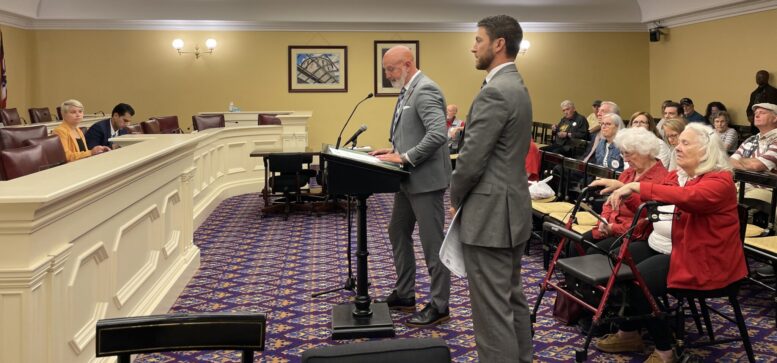Two Ohio lawmakers are threatening felony charges if delegates take up outside issues in a hypothetical future convention
BY NICK EVANS
This week state lawmakers introduced a measure setting the guidelines for a hypothetical future constitutional convention.
The obscure process laid out in Article V of the U.S. Constitution has been embraced in recent years by activists to impose congressional term limits, balanced budget requirements or place new limits on money in politics. But there are precious few details in the Constitution about how it would operate.
Among the guardrails lawmakers proposed, delegates could face recall for speaking publicly about internal business. If they took up proposals deemed out of bounds, they could face a felony.
Additionally, federal officeholders or appointees and statewide officeholders would be barred from serving as delegates. State representatives or senators, however, would still be eligible. Although the bill directs lawmakers to select an odd number of delegates, there’s no mention of minority party representation.
The convention route is attractive to supporters because organizers can largely sidestep Congress, stacking up resolutions in state legislatures until they reach the required 2/3 threshold of 34 states. From there, convention backers are already a long way toward the 3/4 threshold (38 states) necessary to ratify an amendment.
The problem, government watchdogs argue, is that once you call a convention, all bets are off. While the U.S. Constitution lays out the benchmarks for ratification, it’s unclear on the rules for the convention itself.
Some argue the convention could have a limited “call” laid out in the states’ resolutions. It’s not clear, however, what would come of a so-called “runaway” convention that takes on matters outside that scope. In committee Wednesday, Ohio’s House Government Oversight Chairman Rep. Bob Peterson, R-Selina, said the very first constitutional convention might fit that definition.
“Thank God and thank goodness,” he added, “because they did great work.”
Catherine Turcer from Common Cause Ohio acknowledged there’s “something really inspiring” about picking up the pen the founders put down.
“It’s also, you know, terrifying,” she said, “when you think about it as an opportunity to open up absolutely every single issue.”
“We’re in such a contentious, just an incredibly contentious time for this kind of robust discussion,” she added.
Article V efforts
State Reps. Riordan McClain, R-Upper Sandusky, and Bernie Willis, R-Springfield, have sponsored House Joint Resolution 3, which calls for a convention of the states. Their resolution, which has already had several hearings, includes explicit provisions aiming to limit the scope of delegates’ work.
Delegates are restricted to “proposing amendments that impose fiscal restraints on the federal government, limit the power and jurisdiction of the federal government, and limit the terms of office for its officials and Members of Congress,” according to the resolution.
The measure also carries language specifying Ohio’s call can only be combined with others drafted toward the “substantially same purpose,” and to rescind the application after the fact if the eventual convention considers changes to the Bill of Rights.
It’s not a carbon copy of the model resolution provided by Convention of States Action, but it would fit under the heading of “substantially same.” The organization has the backing of effectively every leading light in the conservative movement, and it has successfully lobbied for convention resolutions in 19 states.
It’s not the only effort to organize an Article V convention, however. The group Wolf-PAC, founded by Cenk Uygur, is promoting campaign finance reform in the wake of Citizens United. Wolf-PAC has passed resolutions in four states.
Although both groups insist it’s possible to limit the scope of a convention, it’s also uncharted territory. Wolf-PAC points to peer-reviewed studies and opinions from U.S. Justice Department officials. But because it has never been done before, there’s no judicial precedent.
“The convention could make its own rules and set its own agendas,” Turcer explained. “And it is true that, whether it’s the state legislature or Congress, they might try to limit the convention. But there’s no way to assure that the members of the convention would actually obey those rules.”
“It’s its own entity,” she added.
Convention of States notes that the biggest safeguard is the ratification process itself. Whatever the convention comes up with still needs the backing of 38 states, whether within its original scope or outside of it.
“That means if only 13 states vote no, the answer is no. It doesn’t get much safer than that!” the Convention of States website insists.
Still, there’s no denying some measure of uncertainty. No matter how narrowly convention backers draft their resolutions, even they acknowledge they have no say in the text of the eventual amendment.
A Congressional Research Service study from 2016 noted calling a convention to vote on a specifically worded amendment is one way Congress could argue states’ applications were “defective and invalid.”
Because the Constitution gives Congress or a convention the right to “propose” amendments, calling a convention simply for an up or down vote misconstrues its function. Its role is to deliberate and propose, not to approve or disapprove.
Limiting efforts
On Wednesday, McClain and Willis introduced their bill establishing the process for selecting delegates and policing their behavior as part of the convention.
“We want to be clear on the process both before and during a convention,” McClain said, “to make sure that the runaway (convention) does not happen, the delegates do not disobey their oath and their responsibility to this great state.”
The sponsors envision an Advisory Committee, responsible for keeping tabs on the delegation and recalling members who violate rules. It would be made up of three members of the General Assembly. The House Speaker and Senate president would get one designee each and the third would be a joint selection approved by a majority in each chamber.
Among the violations that could get a delegate recalled: expressing disagreement publicly once the delegation has taken a formal position, or speaking with the media at all if they aren’t the member designated handle communications.
“I believe the whole intent there is to have one voice for Ohio,” Willis explained. “And that that group of delegates are charged with producing that one message because there is only going to be one vote.”
State Rep. Richard Brown, D-Canal Winchester, criticized the bill for not requiring representation from both political parties in the convention delegation or the advisory committee.
“Because like it or not,” he said, “we do have to parties in this state.”
McClain insisted, “I don’t see this as a partisan issue, frankly.”
He argued with the supermajorities required for passage, “to get anything through a convention of these United States it cannot fall on party line.”
Speaking after the hearing, McClain framed the legislation as a work in progress. He chalked up the decision to cut out statewide and federal officials, but not general assembly members, to delegates not being “considered a statewide position.”
But he acknowledged, “I’ve have had some conversations with members about looking at that provision, if we should exclude state lawmakers as well. So, I don’t know what the conversations will come (to), but this is the starting point for the for the bill.”
He also referenced hearing feedback on the minimum number of years required as a U.S. citizen and a resident of Ohio as well as how to handle dual citizens.
“Ultimately it’s about getting the right people there that are going to truly represent the voice of what Ohio wants,” he said.
Bigger penalties
While the bill threatens recall for delegates who speak out of turn, it proposes far harsher penalties for those who act outside the joint resolution’s scope.
Any member who votes for or promotes a convention voting process other than one vote per state, votes for an amendment altering the Bill of Rights, the Civil War Amendments or several others, votes for an amendment beyond the joint resolution’s call, would be guilty of a third-degree felony. Accepting gifts from anyone other than a family member worth more than $200 combined gets the same treatment.
“I get where you all were going in the sense of trying to make sure that things were protected in all of that,” Rep. Latyna Humphrey, D-Columbus, said. “But do you think that the penalty might be a little too high?
“F3 is real high,” she added. “It’s very high.”
“I think that the stakes are high,” McClain responded. “We want to say that the oath that you swear to do your duty means something, and that if you deviate from that it’s gonna be significant.”
Turcer is left shaking her head. To her, the bill’s heavy-handed punitive measures only underscore the risk of pursuing a convention.
“It’s as if the sponsor buys the premise that you could have a runaway convention and wants to come up with rules to rein it in,” she said, “without thinking really big picture that, you know, Ohio is not the center of the universe. It’s not an island, we’re one state, and the convention sets its own rules.”
“So, there’s a clear understanding that there need to be rules,” she added, “without understanding that you don’t get to choose.”
If past is prologue…
Ironically, in making the case for delegates restricting their focus to a limited call, McClain brought up Ohio’s recent special session. The governor called lawmakers back to the statehouse for the express purpose of ensuring Joe Biden got on the ballot and prohibiting campaign spending by foreign nationals, and they did.
“I see that much akin to what the convention is called for,” McClain said, “and the conversations that would happen at a convention with members to say that this this topic was not for what we were called, we cannot go down that path without experiencing issues both legally and otherwise.”
The problem is, at least in the eyes of two long-serving Republican House lawmakers, the Ohio Senate did exceed the governor’s narrow mandate. Rather than starting from scratch, the Senate tacked the governor’s demands onto an unrelated bill changing how statewide issues are numbered.
In a joint statement, Reps. Scott Oelslager, R-North Canton, and Bill Seitz, R-Cincinnati, called that “unprecedented because it includes provisions that are extraneous to the Governor’s call for a special session.”
“The way the Senate is conducting business is constitutionally and procedurally questionable,” they continued, “and it presents undue litigation risk that can be wholly avoided by reaching agreement between the chambers on a correctly numbered bill.”
In the end, the Senate abandoned its approach and accepted the legislation that passed in the House. But the episode highlights lawmakers’ tendency to take on outside issues at least as much as it demonstrates their ability to rein in those impulses. In the committee hearing, Chairman Peterson reminded McClain and Willis of these “differences of opinion” and asked if their bill adequately addressed the issue.
“I would say that this is at least a step forward,” Willis argued. “If it is the ultimate solution, I don’t think we know.”



